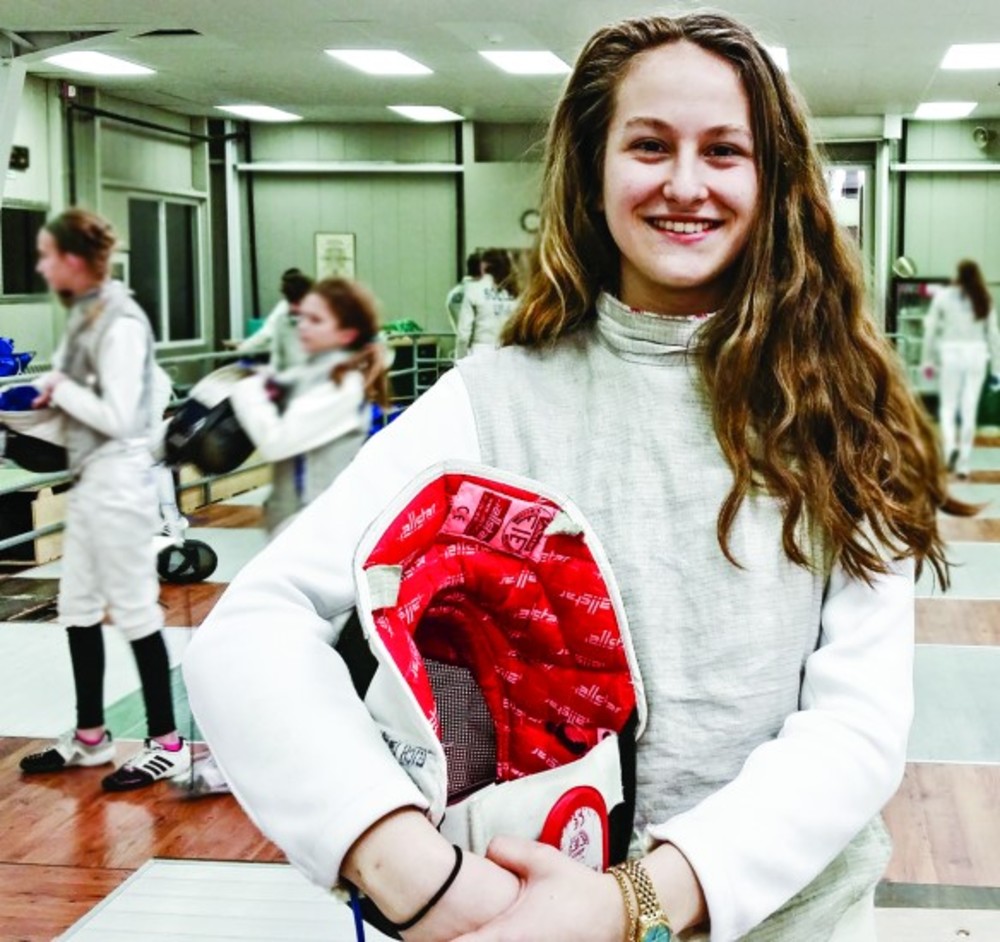15-year-old fencer excels at more than swordplay
 Julia Shalansky in full gear during practice at RIFAC. /Ariel BrothmanTrying to poke people with a sword isn’t the first thing that comes to mind when you think of ways to find yourself, but 15-year-old Julia Shalansky credits fencing with giving her confidence, maturity and an outgoingness that she says she didn’t have when she was younger.
Julia Shalansky in full gear during practice at RIFAC. /Ariel BrothmanTrying to poke people with a sword isn’t the first thing that comes to mind when you think of ways to find yourself, but 15-year-old Julia Shalansky credits fencing with giving her confidence, maturity and an outgoingness that she says she didn’t have when she was younger.
Julia, who lives in Providence, is a regular competitor in the national circuit of fencing, having most recently placed silver in cadet women’s foil in two prequalifying competitions for the Junior Olympics. The first competition, in November, was in the under-17 group, and the second in under-20, in December. Both took place in Waltham, Mass.
While she’s an established fencer now, Julia got into fencing by serendipity. A few years ago, Julia’s mother took her and her sister to the Boston Children’s Museum to pass the time while their father was in a meeting in the city, and there was an interactive fencing exhibit in which Julia and her sister took part. Julia remembers it vividly.
“It was fun! I got to try stuff on, and I got to stab my sister,” she says, laughing. “I liked stabbing her, but she didn’t like it that much.”
Julia’s sister is now a dancer.
While she has won several competitions, both Julia and her coach, Alex Ripa, founder of the Rhode Island Fencing Academy & Club, in East Providence, place personal development above winning. According to Julia, that is what makes RIFAC different from other fencing clubs.
“Alex is very into mental awareness and understanding yourself, which is essential for fencing and for life,” she says. “This is what’s different about this club; other clubs are a lot more athletically-oriented.”
“It’s about who you’re going to be as a person, not a fencer,” says Ripa. “When you switch the focus from winning to learning … fencing reveals our character very well.”
One example is in choosing your sword. There are three kinds of swords in the fencing world – foil, epee and saber – and, according to both Ripa and Julia, the kind of sword a fencer is drawn to reveals something about his or her personality.
“Each individual group [of fencers] is drastically different,” Julia observes. “Foil is focused, epee is whimsical and free, and the saber is very intense.”
Fencing with the foil – the sword Julia uses – requires focus in part because of the size of the striking area. Foil fencers must strike within a smaller area to gain a point.
In addition to striving for students’ personal development, Ripa also works to ensure that the students have fun while learning to fence. Students are “given permission to laugh at themselves” for their quirks, or what are known at RIFAC as “foibles,” and play games to help improve their technique.
“I love games, so everything I do, I try to fit into the concept of a game,” says Ripa. “If it’s not fun, why do it?”
Another aspect of fencing at RIFAC is that it broadens students’ horizons. Julia says that once fencers have registered for a tournament, other registered fencers across the country can see their names on an online list. Tournaments are an opportunity to fence and compete, but also an opportunity to catch up with friends made at previous tournaments around the country.
“You get different perspectives from different people from different clubs,” says Julia. “It’s great!”
Students can learn from fencers outside the U.S. as well; hanging from the ceiling on one side of the club are about 25 flags representing the countries of students who have come to study at RIFAC. Both Julia and Ripa said that each country has its own strengths and style of fencing.
Julia’s favorite fencers tend to be Italian, including veteran fencer Valentina Vezzali. Ripa often analyzes the technique of famous fencers to help his students learn. He queues up a video clip of Vezzali narrowly winning against a French fencer, and Julia is immediately captivated.
“She’s so fast!” Julia exclaims as other student fencers crowd around the TV to watch.
Even though the sport of fencing dates back to the 15th century, and the art of swordplay has a history that is even older than the original Olympics, Ripa says fencers still debate passionately about the best way to hold a sword.
“I love that there’s always more to learn. No one can ever say they’re the best,” says Julia. “Even Vezzali!”
For this reason, RIFAC has a mentorship program that matches more experienced fencers with younger fencers. When Julia’s former mentor leaves RIFAC this spring for college, Julia will be the oldest mentor at RIFAC.
When Ripa reminded her of this, she smiled and said, “I know! It’s going to be great, but definitely an adjustment.”
Julia will travel to Cleveland to compete in the Junior Olympics in February.
ARIEL BROTHMAN is a freelance writer who lives in Wrentham, Mass.







